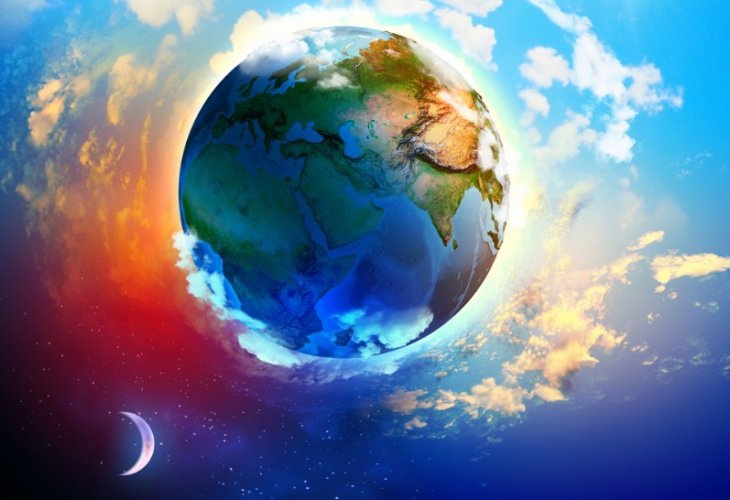Faith
Is the Universe Natural or Spiritual? A Jewish and Scientific Perspective
Exploring the harmony between nature, miracles, and divine law through science, faith, and timeless wisdom

Eli asks: "Hello. I would like to understand if the universe is natural or spiritual, On one hand, it is known that everything exists only by the will of God at every moment, which means everything is spiritual. However, since the creation of the world, nature has not changed, which makes it material. I’d be glad if you could resolve this contradiction."
* * *
Hello Eli, and thank you for your question.
There were times in history when people mistakenly believed that our universe was entirely material, solid, and unchanging. Nature seemed to them like the sum total of reality, while abstract spiritual concepts were dismissed as unscientific. In recent centuries however, reality has surprised us with astonishing scientific discoveries: invisible radiation was revealed to exist, energy was found to pass through solid matter, and it was discovered that energy can become matter and matter can become energy. It became clear that the universe is not just “solid matter” as once thought, but also holds within it abstract, formless energy. Science concluded that the universe is governed by immense invisible forces. Scientists conveniently call these “laws of nature,” but in truth they are descriptions of unseen powers at work in creation, existing and operating despite having no physical substance. Today, scientists speak of invisible dimensions, waves, frequencies, and non-material forces — concepts that, in earlier times, could only have been voiced by mystics.
Few people grasp how profound it is that our universe is made up of both spirit and matter, working in harmony. The world is not the rigid materialistic realm people once imagined. A person of faith looks honestly at creation and sees things as they really are: divine providence is evident, God directs creation, and all forces are simply His hand in action.
What is the difference between “nature” and “miracle”?
Rabbi Eliyahu Dessler explains that what we call “nature” is just another word for “habit”. Anything we are accustomed to seeing regularly, we label as natural. For example, if the splitting of the sea occurred in every body of water until this very day, scientists would have invented a Latin term for it and classified it as a law of nature. After all, what’s “natural” about the fact that the earth spins endlessly on its axis, or that it revolves around the sun, or that the moon orbits the earth with no strings or supports? Between the celestial bodies there is nothing but empty space. The mysterious “force” that pulls and moves them is called “gravity”. Does giving a scientific name to this phenomenon make it truly natural?
What moves atoms and molecules? Scientists give these forces names such as “the strong nuclear force”, “the weak nuclear force”, or “the electromagnetic force”. They observe these forces and describe them, but science cannot explain why such non-physical forces exist, or why they continue working at every moment without fail.
Does this make our universe natural or spiritual? The truth is, these are just two words for the same thing. What we call “natural” is simply spiritual action persisting steadily. Science and miracle are one. King David already defined the laws of nature this way: “Let them praise the name of the Lord, for He commanded and they were created. He established them forever and ever; He made a law that shall not be broken” (Psalms 148:5–6).
Since the creation of the world, God has not changed the laws He established, and therefore, these laws are called “nature”. The Hebrew word teva (nature) comes from a root meaning “embedded” or “fixed” — something that persists and does not change. In truth, there is no difference between nature and miracle.
Technological progress itself shows that many things that seemed miraculous in the past are now known to be embedded in nature. For example, the idea that human beings could live hundreds of years once seemed miraculous. Modern research however indicates that aging is programmed into DNA, and in theory, human cells could replicate flawlessly for centuries without aging. Today, scientists are searching for the biological “switch” that could extend human life. A hundred years ago, such talk would have been dismissed as fantasy or miracles — yet now we see that “nature” and “miracle” are bound together in God’s design.
The Talmudic Sages also taught that even the greatest miracles were embedded into creation from the start. As the Mishnah says: “Ten things were created at twilight before the first Shabbat: the mouth of the earth, the mouth of the well, the mouth of the donkey, the rainbow, the manna, the staff, the shamir worm, the script, the writing, and the tablets” (Pirkei Avot 5:6). They revealed that miracles are not exceptions to creation but are part of the divine laws woven into it.
We often separate in our language between “science” and “spirit”, “nature” and “miracle”, but we forget that the greatest scientist is God Himself. He created the living cell, more complex than New York City. He created biological cameras — the eyes, which are more advanced than any human invention. He created the brain, the most sophisticated supercomputer in existence, with its software of instincts, memory storage, and control over every body function.
Why, then, are we so quick to divide matter from spirit, science from miracle, without realizing that both flow from the same Source who sustains them? In truth, the border between miracle and nature exists only in our imagination.

